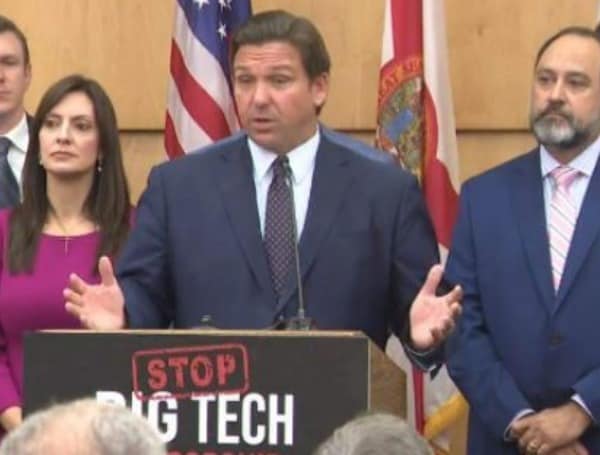Florida Gov. DeSantis Announcing Big Tech Lawsuit (TFP File) The Supreme Court sent cases on whether two red state laws intended to prevent viewpo
The Supreme Court sent cases on whether two red state laws intended to prevent viewpoint-based censorship on social media violate the First Amendment back to lower courts on Monday.
The majority reversed two lower court rulings in cases brought by NetChoice, an internet trade group that sued Florida and Texas over the laws. NetChoice argued the states violated the First Amendment rights of platforms by compelling speech and preventing the companies from exercising editorial discretion.
“The parties have not briefed the critical issues here, and the record is underdeveloped,” Justice Elena Kagan wrote in the ruling. “So we vacate the decisions below and remand these cases. That will enable the lower courts to consider the scope of the laws’ applications, and weigh the unconstitutional as against the constitutional ones.”
Read: U.S. Supreme Court Issues Ruling On Former President Trump’s Immunity
In 2022, the 11th Circuit Court of Appeals blocked Florida’s law, which restricts platforms from banning political candidates and “journalistic enterprises.” However, the Fifth Circuit Court of Appeals later that year upheld Texas’ law, which prohibits platforms with over 50 million monthly U.S. users from censoring users or content based on viewpoint.
The Fifth Circuit found that corporations do not “have a freewheeling First Amendment right to censor what people say.”
Kagan wrote there is “enough litigation already to know that the Fifth Circuit, if it stayed the course, would get wrong at least one significant input into the facial analysis.”
“The parties treated Facebook’s News Feed and YouTube’s homepage as the heartland applications of the Texas law,” Kagan wrote. “At least on the current record, the editorial judgments influencing the content of those feeds are, contrary to the Fifth Circuit’s view, protected expressive activity.”
Oral arguments for the NetChoice cases were held in February.
Read: CNN Host Pushes Back On Ex-DNC Chair’s Claim It’s Only ‘Elites’ Fretting About Biden Debate
The Supreme Court ruled last week on another major First Amendment case, Murthy v. Missouri, reversing a lower court’s injunction preventing the Biden administration from “coercing or significantly encouraging” social media companies to suppress speech. The Court found 6-3 that plaintiffs who challenged the government’s efforts encouraging platforms censor speech on hot-button issues like COVID-19 and the 2020 election did not have standing to sue, as they failed to “link their past social-media restrictions to the defendants’ communications with the platforms.”
In his dissent, Justice Samuel Alito slammed the majority for permitting “the successful campaign of coercion in this case to stand as an attractive model for future officials who want to control what the people say, hear, and think.” He called the government’s efforts “blatantly unconstitutional.”
In May, the Court unanimously allowed the National Rifle Association (NRA) to pursue its free speech lawsuit against former superintendent of the New York Department of Financial Services (DFS) Maria Vullo. The justices found the NRA had “plausibly alleged” the official violated its First Amendment rights, holding that government officials cannot “use the power of the State to punish or suppress disfavored expression.”

First published by the Daily Caller News Foundation.
Help support the Tampa Free Press by making any small donation by clicking here.
Android Users, Click To Download The Tampa Free Press App And Never Miss A Story. Follow Us On Facebook and Twitter. Sign up for our free newsletter.

